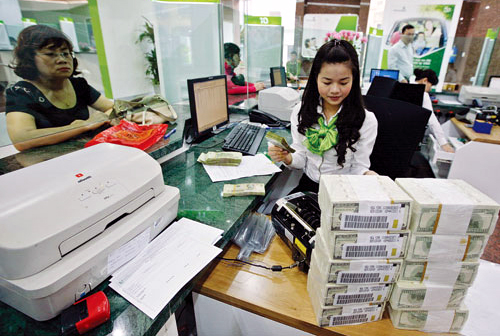VietNamNet Bridge – Currently, foreign investors can hold no more than 30 percent of shares in one Vietnamese bank, but the proportion may rise to 100 percent by 2020.

State Bank of Vietnam (SBV) officials have repeatedly stated at formal events that the country encourages foreign investors to buy shares in Vietnamese banks.
Under current laws, maximum total foreign ownership share is 30 percent. A foreign non-strategic shareholder can hold up to 15 percent of the bank’s chartered capital, while a strategic shareholder can hold up to 20 percent or higher if approved by the Prime Minister.
Most recently, SBV’s Governor told the press there will be no limitations on foreign ownership in weak banks that have to undergo compulsory restructuring.
The current limit on foreign ownership will be automatically lifted in 2020 at the latest, because Vietnam, as a member of WTO, has promised to remove the cap by that time.
Concerns have been raised that once foreign investors are allowed to hold 100 percent of shares of Vietnamese banks, they would be able to control the Vietnamese financial market.
However, financial analysts believe this will not happen. Only foreign banks which can satisfy requirements on total assets, stockholder equity and financial safety indexes will be eligible to buy Vietnamese bank shares.
With high requirements set by SBV, only large foreign banks with high transparency will be welcomed in Vietnam, which would make it easier for SBV to control them.
Dr. Le Dang Doanh, a renowned economist, believes that Vietnam should welcome foreign investors rather than worry.
He said this would not cause difficulties for SBV as a watchdog agency, because of the limited role of foreign investors.
To attract foreign investors, Vietnamese banks must accept to be audited by prestigious independent auditing firms.
Doanh said SBV should create favorable conditions for foreign investors to buy a proportion of shares high enough to satisfy investors.
“Vietnam should learn lessons from Vietnam Airlines’ IPO,” Doanh said. “The air carrier’s shares did not attract investors because of the low percentage of shares offered to the public.”
He said it was not very likely that foreign investors would accept a low proportion of shares which would not give them enough power to manage banks, because “no one wants to give money to others to spend”.
BNP Paribas now holds 20 percent of Orient Bank’s shares; Commonwealth Bank of Australia, 20 percent of VIB; Maybank, 20 percent of ABB Bank; Societe Generale, 20 percent of SeABank; United Overseas Bank, 20 percent of Southern Bank; Bank of Tokyo-Mitsubishi, 19.73 percent of VietinBank; HSBC Holding, 19.41 percent of Vietcombank; Standard Chartered, 15.42 percent of ACB; Sumitomo Mitsui Banking Corp. 15.07 percent of Eximbank; and Mizuho Corporate Bank, 15 percent of Vietcombank.
Kim Chi